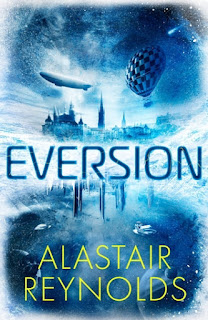Now I know.
"The geometry..." he murmured. "The geometry! I think I can see it! Each quarter section is homeomorphic to a triangle!" He stared back to us, wide-eyed and uncomprehending of our own inability to visualize what was plain to him. "Can't you see it? It's beautiful! And hideous! It's... not right!"
A ship called, just like the one that carried Dracula to England, the Demeter, has been engaged by a boorish Russian oligarch/magnate to follow up on a magnificent discovery at the edge of the known world. The magnate, Topolosky (wink), spared no expense on equipment but values secrecy over quality when it comes to the mode of transportation and the crew who will get him, his burly assistant Ramos, and his pet mathematics prodigy, Dupin, to where the mystery awaits. Meaning the captain and crew are competent but not spectacularly so, but, Topolosky thinks, are less likely to ask awkward questions or make unreasonable demands for things like advance warning of hazards to life and limb, etc. This is a nice and meaty beast of a plotline right here, but this is Alastair Reynolds hitting new heights of narrative brilliance, so of course there is a lot more going on.
For starters, Topolosky isn't our point of view character; the ship's medical man, Silas Coade, is. It's Silas' first voyage and he is a terrible lubber as it turns out, so he spends most of his time cooped up in his digs until he is called upon to save Ramos' life after a terrible accident, after which time he forms a friendship with the man as the Demeter nears its mysterious destination and various tall tales and outright lies on the part of Topolosky can no longer be denied. It's the Age of Sail and they're way north of Spitsbergen and approaching a cove and a hidden lagoon where a bizarre structure they call the Edifice awaits them. No, wait, it's the Age of Steam and they're tramping along the coast of Patagonia looking for a fissure that will admit them to the interior of a vast glacier concealing a mysterious Edifice. No, wait, they're aboard a state-of-the-art airship approaching the hole at the bottom of Antarctica that will admit them to the interior of the Hollow Earth where a mysterious Edifice clings to the ice and rock above the Void. No, wait, they're plying interstellar space on a ship that would make Flash Gordon or Buck Rogers proud and approaching a... oh, no, wait, they're on a spaceship, but it's just moving within our solar system, following up on an earlier effort to explore what's under the ice on the Jovian moon of Europa...
Each iteration of the story unfolds gracefully and reveals a little bit more of the true nature of the Demeter and its mission. Silas is an aspiring novelist in addition to being a doctor, and he's keeping the crew entertained with his futuristic imaginings of what a more advanced version of their mission might be like -- or are they retro ones? Along the way, the crew's lone female member, the lovely Ada Cossile, keeps nagging at him to do better, to try harder, to get it right, damn it, hinting that their situation is way more dire than it seems.
Each iteration also comes to concern itself with a deeply deranged and near-insolvable mathematical conundrum; the Edifice is not of any known human manufacture and seems to have deformed itself -- to have turned itself partly inside-out or everted, toward an unknown but probably sinister end. And Topolosky's great wish is to explore it first, claim credit for discovering its secrets and, of course, to profit from any applications might result from the study of the Edifice -- even if it costs a life or two.
The final layer of the mystery is as beautiful as it is heartbreaking, and every tear it jerks is earned in a way that only the more recent of Reynolds' work has accomplished (I'm thinking from Poseidon's Children through the great Revenger novels, of course), because these are fully imagined people whose dilemmas and danger have real emotional heft -- but none of Reynolds' trademark awe-inspiring and cosmic scale is sacrificed in the process. He really does just get better and better, you guys! I can't wait to see what he's got for us next, and he remains my number one buy-on-sight science fiction author. Tremendous stuff!


